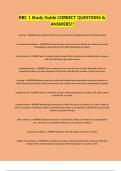RBC 1 Study Guide CORRECT QUESTIONS &
ANSWERS!!
case law - ANSWER Court opinions that are issued over time through the power of judicial review
circumstantial evidence - ANSWER Evidence that does not prove a fact directly, but rather is personal
knowledge or observations from which deductions are drawn
consent search - ANSWER Search conducted with consent that is voluntary and obtained from a person
with the authority to give that consent
contemporaneous - ANSWER Search conducted at or near the time of arrest, although either can
precede the other, at or near the place of the arrest, and while the arrestee is still on the scene
curtilage - ANSWER Relatively small and usually well-defined area immediately around a residence to
which the private activities of the home extend, and in which the owner has an expectation of privacy
custodial arrest - ANSWER Arrest in which the suspect will be transported to a station, jail, detox center,
juvenile hall, or school
custodial lineup - ANSWER Identification procedure in which the victim or witness to a crime is asked to
look at a number of individuals within a custodial environment in an attempt to identify the suspect (also
known as a physical lineup)
direct evidence - ANSWER Evidence that proves a fact directly, without an inference or presumption
(e.g., the sale of a controlled substance to an undercover officer)
evanescent evidence - ANSWER Evidence that will change or be lost over time
exigent circumstances - ANSWER An emergency situation requiring swift action to prevent imminent
danger to life, serious danger to property, imminent escape of a suspect, or the
, destruction of evidence
field showup - ANSWER Viewing of a suspect by the victim or witness that commonly occurs in the field
shortly after a crime has been committed
implied consent - ANSWER By obtaining a driver's license in California a person has agreed to chemical
testing without a warrant (i.e., blood, breath, urine)
knock and notice - ANSWER Before entering a dwelling to serve a search warrant, officers must give
notice to persons inside through certain actions
motor vehicle - ANSWER Self-propelled vehicle (e.g., automobiles, airplanes, buses, recreational vehicles,
carts, etc.)
nexus - ANSWER A reasonable connection or link between two or more items
objective reasonableness - ANSWER Whether society is prepared to recognize an individual's expectation
of privacy as reasonable
open fields - ANSWER Outdoor real property, outside the curtilage of the residence
overflight - ANSWER Flight of a plane or helicopter over a given area
parole - ANSWER Extension of a felon's sentence, that is, an additional specific period of time (usually
three years) which a person must serve on the "outside" after having completed the actual prison
sentence
passenger compartment - ANSWER Passenger Compartment can be considered to include all areas
accessible to occupants within the vehicle
, photographic spread - ANSWER Identification procedure in which the victim or witness to a crime is
asked to look at a number of photographs in an attempt to identify the suspect (also known as a
photographic lineup)
plain view - ANSWER Objects in the line of sight of an officer who has the right to be in that position are
subject to seizure without a warrant if the officer has lawful access to the object(s)
probable cause exception - ANSWER Warrantless vehicle search based on probable cause that the
vehicle contains contraband or evidence of a crime. Also referred to as the "automobile exception," or
the "vehicle exception"
probable cause plus - ANSWER Additional show of need, beyond the usual probable cause, required for
bodily intrusion warrants
probable cause to search - ANSWER Enough credible information to provide a fair probability that the
object the peace officers seek will be found at the place they want to search
probation - ANSWER Sentencing alternative for a person convicted of a criminal offense granted at a
judge's discretion
protective search of a vehicle - ANSWER Limited warrantless search of the passenger compartment of a
vehicle for weapons
protective sweep - ANSWER Brief search of a house or building to look for individuals only
public access area - ANSWER Any area that the general public or some members of the public have been
given either express or implied permission to be in
reasonable expectation of privacy - ANSWER When individuals have indicated that they personally
(subjectively) expect privacy in the object or area, and their expectation is one which society is prepared
to recognize as legitimate
, reasonable inference - ANSWER Act of drawing a conclusion from a fact; it is similar to making a
presumption (e.g., seeing smoke and inferring there is a fire)
search - ANSWER Governmental infringement or intrusion upon an expectation of privacy that society is
prepared to consider reasonable
search warrant - ANSWER Written order, in the name of the people, signed by a magistrate, directed to a
peace officer, commanding the officer to search for a person or persons, a thing or things, or personal
property, and, in the case of a thing or things or personal property, to bring the same before the
magistrate (Penal Code Section 1523)
seizure of a person - ANSWER Peace officer's physical application of force, or a person's voluntary
submission to a peace officer's authority
seizure of property - ANSWER Meaningful interference with an individual's possessory interest in that
property by the government
stable evidence - ANSWER Evidence that will not change over time
standing - ANSWER When a person has a legitimate possessory interest or relationship over an object or
area
subjective expectation of privacy - ANSWER A person's state of mind demonstrated by affirmative action
designed to protect their privacy
valid consent - ANSWER A person can give permission for search of areas/items within their control
vehicle inventory - ANSWER Procedure peace officers use to account for personal property in a vehicle
that is about to be impounded or stored
voluntary consent - ANSWER An act of free will and not the result of duress or coercion




